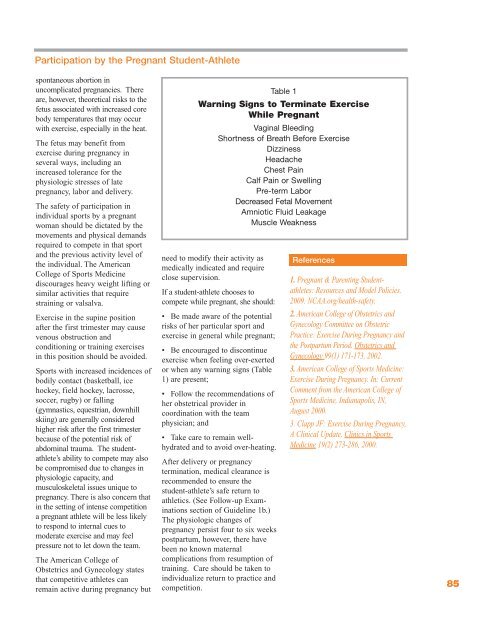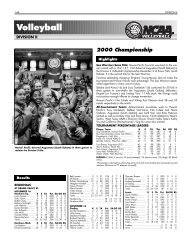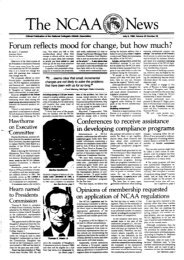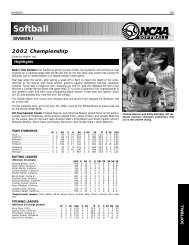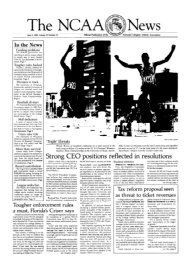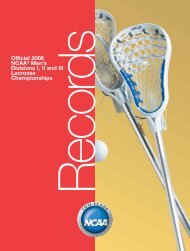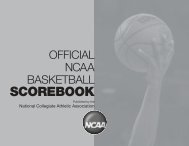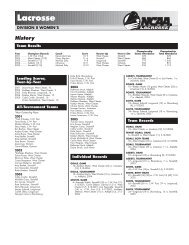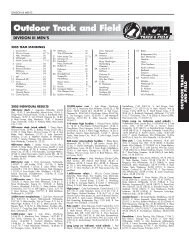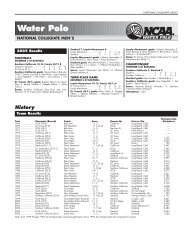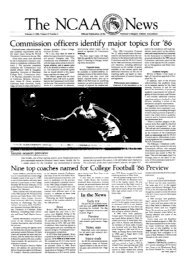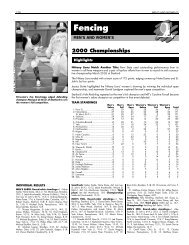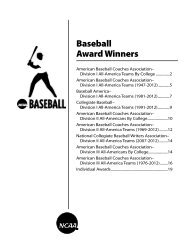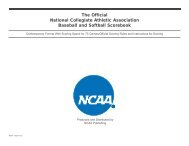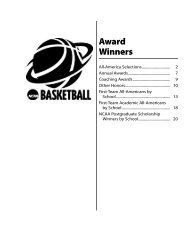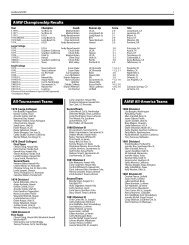Sports Medicine Handbook - NCAA
Sports Medicine Handbook - NCAA
Sports Medicine Handbook - NCAA
You also want an ePaper? Increase the reach of your titles
YUMPU automatically turns print PDFs into web optimized ePapers that Google loves.
Participation by the Pregnant Student-Athlete<br />
spontaneous abortion in<br />
uncomplicated pregnancies. There<br />
are, however, theoretical risks to the<br />
fetus associated with increased core<br />
body temperatures that may occur<br />
with exercise, especially in the heat.<br />
The fetus may benefit from<br />
exercise during pregnancy in<br />
several ways, including an<br />
increased tolerance for the<br />
physiologic stresses of late<br />
pregnancy, labor and delivery.<br />
The safety of participation in<br />
individual sports by a pregnant<br />
woman should be dictated by the<br />
movements and physical demands<br />
required to compete in that sport<br />
and the previous activity level of<br />
the individual. The American<br />
College of <strong>Sports</strong> <strong>Medicine</strong><br />
discourages heavy weight lifting or<br />
similar activities that require<br />
straining or valsalva.<br />
Exercise in the supine position<br />
after the first trimester may cause<br />
venous obstruction and<br />
conditioning or training exercises<br />
in this position should be avoided.<br />
<strong>Sports</strong> with increased incidences of<br />
bodily contact (basketball, ice<br />
hockey, field hockey, lacrosse,<br />
soccer, rugby) or falling<br />
(gymnastics, equestrian, downhill<br />
skiing) are generally considered<br />
higher risk after the first trimester<br />
because of the potential risk of<br />
abdominal trauma. The studentathlete’s<br />
ability to compete may also<br />
be compromised due to changes in<br />
physiologic capacity, and<br />
musculoskeletal issues unique to<br />
pregnancy. There is also concern that<br />
in the setting of intense competition<br />
a pregnant athlete will be less likely<br />
to respond to internal cues to<br />
moderate exercise and may feel<br />
pressure not to let down the team.<br />
The American College of<br />
Ob stetrics and Gynecology states<br />
that competitive athletes can<br />
remain active during pregnancy but<br />
Table 1<br />
Warning Signs to Terminate Exercise<br />
While Pregnant<br />
Vaginal Bleeding<br />
Shortness of Breath Before Exercise<br />
Dizziness<br />
Headache<br />
Chest Pain<br />
Calf Pain or Swelling<br />
Pre-term Labor<br />
Decreased Fetal Movement<br />
Amniotic Fluid Leakage<br />
Muscle Weakness<br />
need to modify their activity as<br />
medically indicated and require<br />
close supervision.<br />
If a student-athlete chooses to<br />
compete while pregnant, she should:<br />
• Be made aware of the potential<br />
risks of her particular sport and<br />
exercise in general while pregnant;<br />
• Be encouraged to discontinue<br />
exercise when feeling over-exerted<br />
or when any warning signs (Table<br />
1) are present;<br />
• Follow the recommendations of<br />
her obstetrical provider in<br />
coordination with the team<br />
physician; and<br />
• Take care to remain wellhydrated<br />
and to avoid over-heating.<br />
After delivery or pregnancy<br />
termination, medical clearance is<br />
recommended to ensure the<br />
student-athlete’s safe return to<br />
athletics. (See Follow-up Examinations<br />
section of Guideline 1b.)<br />
The physiologic changes of<br />
pregnancy persist four to six weeks<br />
postpartum, however, there have<br />
been no known maternal<br />
complications from resumption of<br />
training. Care should be taken to<br />
individualize return to practice and<br />
competition.<br />
References<br />
1. Pregnant & Parenting Studentathletes:<br />
Resources and Model Policies.<br />
2009. <strong>NCAA</strong>.org/health-safety.<br />
2. American College of Obstetrics and<br />
Gynecology Committee on Obstetric<br />
Practice: Exercise During Pregnancy and<br />
the Postpartum Period. Obstetrics and<br />
Gynecology 99(1) 171-173, 2002.<br />
3. American College of <strong>Sports</strong> <strong>Medicine</strong>:<br />
Exercise During Pregnancy. In: Current<br />
Comment from the American College of<br />
<strong>Sports</strong> <strong>Medicine</strong>, Indianapolis, IN,<br />
August 2000.<br />
3. Clapp JF: Exercise During Pregnancy,<br />
A Clinical Update. Clinics in <strong>Sports</strong><br />
<strong>Medicine</strong> 19(2) 273-286, 2000.<br />
85


